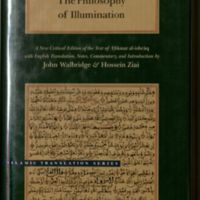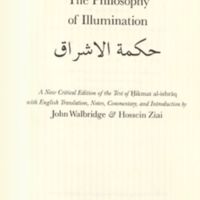The philosophy of illumination: Ḥikmat al-ishrāq : a new critical edition of the text of Ḥikmat al-ishrāq
Dublin Core
Title
The philosophy of illumination: Ḥikmat al-ishrāq : a new critical edition of the text of Ḥikmat al-ishrāq
Subject
Suhrawardī, Yaḥyá ibn Ḥabash, 1152 or 1153-1191. Ḥikmat al-ishrāq
Sufism -- Early works to 1800
Sufism -- Early works to 1800
Description
Shihab al-Din al-Suhrawardi was born around 1154, probably in northwestern Iran. Spurred by a dream in which Aristotle appeared to him, he rejected the Avicennan Peripatetic philosophy of his youth and undertook the task of reviving the philosophical tradition of the "Ancients." Suhruwardi's philosophy grants an epistemological role to immediate and atemporal intuition. It is explicitly anti-Peripatetic and is identified with the pre-Aristotelian sages, particularly Plato. The subject of his hikmat al-Ishraq--now available for the first time in English--is the "science of lights," a science that Suhrawardi first learned through mystical exercises reinforced later by logical proofs and confirmed by what he saw as the parallel experiences of the Ancients. It was completed on 15 September 1186 and at sunset that evening, in the western sky, the sun, the moon, and the five visible planets came together in a magnificent conjunction in the constellation of Libra. The stars soon turned against Suhrawardi, however, who was reluctantly put to death by the son of Saladin, the sultan of Egypt, in 1191.
Creator
Suhrawardī, Yaḥyá ibn Ḥabash, 1152 or 1153-1191
Publisher
Provo, Utah : Brigham Young University Press
Date
1999
Contributor
with English translation, notes, commentary, and introduction by John Walbridge & Hossein Ziai
Relation
Series: Islamic translation series
Text Item Type Metadata
Original Format
Book
Citation
Suhrawardī, Yaḥyá ibn Ḥabash, 1152 or 1153-1191, “The philosophy of illumination: Ḥikmat al-ishrāq : a new critical edition of the text of Ḥikmat al-ishrāq,” Humanities Hub, accessed February 25, 2026, https://humanitieshub.sdsu.edu/omeka/items/show/1229.


